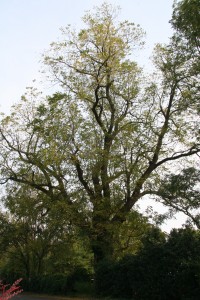Black walnut
Juglans nigra
Native to Delaware, walnut prefers deep, rich, moist soils. Walnuts are usually planted in open areas within an urban environment because they are allelopathic (produce toxins harmful to other plants). Walnuts develop best on deep, well-drained soils and black walnut trees are prized for their wood, which is used for veneer and furniture because it is durable and worked easily. Inside a yellow-green fibrous husk is the sweet and edible nut favored by many wildlife.
Black walnut has compound leaves that are up to 24 inches long with 15 to 23 sharply-oval, toothed, and long-pointed leaflets.
| Black walnut – Juglans nigra | ||||
| Location | Points | C.B.H. | Height | Crown |
| Holy Cross Church, Dover, DE | 366 | 226 | 114 | 104 |
| 416 Union St., Milton, DE | 333 | 199 | 112 | 88 |
| 961 Old Baltimore Pike, Newark, DE | 306 | 162 | 124 | 79 |

